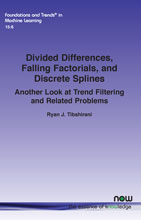Divided Differences, Falling Factorials, and Discrete Splines: Another Look at Trend Filtering and Related Problems
By Ryan J. Tibshirani, Carnegie Mellon University, USA, ryantibs@cmu.edu
Abstract
This monograph reviews a class of univariate piecewise polynomial functions known as discrete splines, which share properties analogous to the better-known class of spline functions, but where continuity in derivatives is replaced by (a suitable notion of) continuity in divided differences. As it happens, discrete splines bear connections to a wide array of developments in applied mathematics and statistics, from divided differences and Newton interpolation (dating back to over 300 years ago) to trend filtering (from the last 15 years). We survey these connections, and contribute some new perspectives and new results along the way.
Divided Differences, Falling Factorials, and Discrete Splines: Another Look at Trend Filtering and Related Problems
This monograph reviews a class of univariate piecewise polynomial functions known as discrete splines, which share properties analogous to the better-known class of spline functions, but where continuity in derivatives is replaced by continuity in divided differences. As it happens, discrete splines bear connections to a wide array of developments in applied mathematics and statistics, from divided differences and Newton interpolation, dating back 300 years, to the recent emergence of trend filtering.
In this concise yet comprehensive monograph, the author uses his recognized expertise on the subject to guide the reader through these connections. In doing so, the author provides an insightful journey through the historical and most recent developments, contributing some new perspectives and results along the way.
Written for researchers and advanced level students of applied mathematics and statistics, this monograph will be of particular interest to those using trend filtering in machine learning applications.
